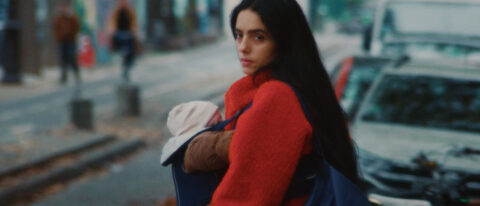If someone tells an innocuous lie at the opening of a movie, they’re certainly likely to tell a much bigger lie later on. When Salomé (Nina Meurisse) asks her best friend Lydia (Hafsia Herzi) in The Rapture (Iris Kaltenbäck, 2023) to check her pregnancy test, Lydia initially tells her that it’s negative. After scanning Salomé’s disappointed reaction, she actually admits, no, it’s positive.
Sound familiar?
Lydia even gives away the direct inspiration, but while Phoebe in Friends does it to see how Rachel really feels, Lydia’s intentions seem more mysterious. Perhaps she just likes toying with people? After all, she needs a bit of fun: she’s going through a lot.
Suffering from her own break-up, and ignoring Belle & Sebastian’s advice that “riding around on city buses for a hobby is sad”, she stops replying to Salomé’s texts and sits on the night bus as it winds endlessly across the streets of Paris. One evening she falls asleep, only to be awoken by the kind bus driver Milos (Alexis Manenti). His insomniac, poetic soul meets her nervous energy; they have a beer and a sandwich in a Hopper-esque dinner before sleeping together.
The first half of Kaltenbäck’s debut is all poetic voiceover, choice montage, musical moments and enigmatic glances, given gorgeous definition courtesy of Hafsia Herzi’s excellent central performance. Spending most of her day job delivering babies as a midwife — caught up close in an excellent succession of sweaty, uncomfortable images — she is evidently capable of great things, perhaps even motherhood itself.
But her free time reveals a sadder, more forlorn soul. Constantly dressed in a bright red jumper that simply screams femme fatale, Herzi fills Lydia with immense longing and a hint of desperation. So when Milos cuts her off for seemingly no reason, she turns to a bigger lie. A much bigger lie indeed.
With all the right ingredients for a noir, especially in its gorgeous evocation of late-night Paris, as well as an excellent soundtrack by Alexandre De La Baume — all subtle string sounds and dissonant melodies — The Rapture is ultimately a victim of its own story construction: the early enigmatic mystery causing all subsequent thriller development to be woefully unwritten. Thus the melancholic story is infected by an overall sense of mid-ness, hampered by easy plot resolutions, clichéd character development, and the inane desire to provide backhanded motivation.
And once the original unease and mystery attempts a last-minute return, the magic is simply gone; what once enraptures, now merely enrages. It’s a shame: a performance and presence like Herzi’s deserved a more engaging film.
Redmond is the editor-in-chief of Journey Into Cinema.
